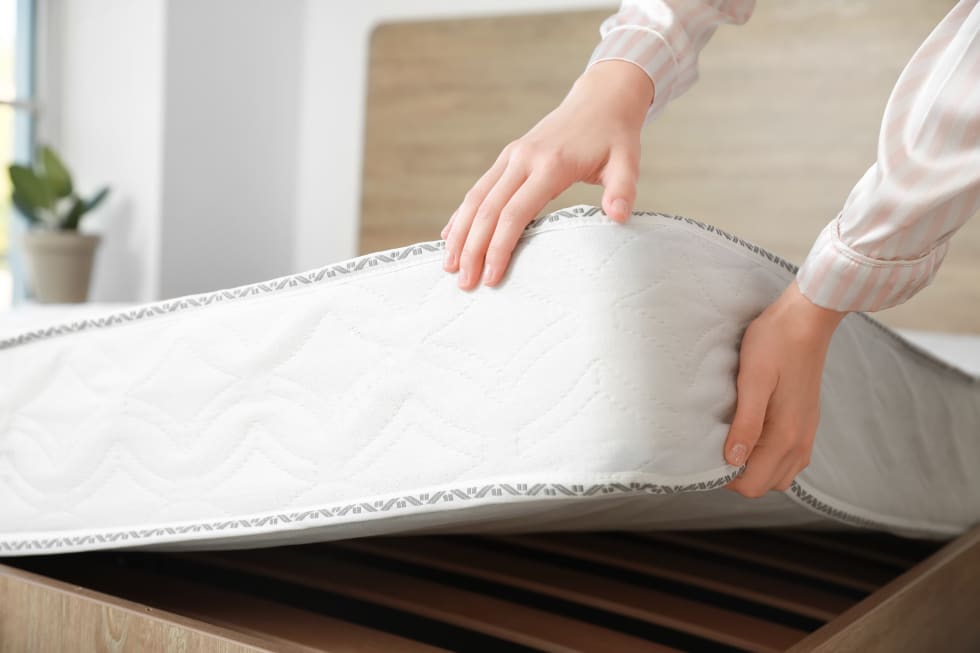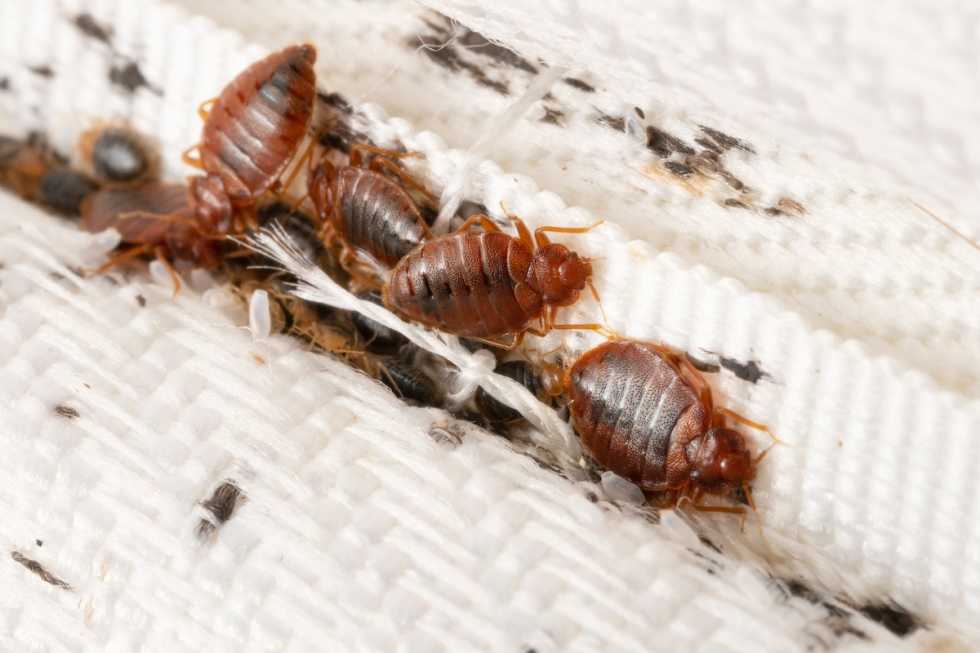South Bank at Quarry Trails
- 93 units available
- Studio • 1 bed • 2 bed • 3 bed
- Amenities
In unit laundry, Patio / balcony, Granite counters, Pet friendly, Stainless steel, Walk in closets + more

If you find bed bugs in your apartment, don't panic! Though bed bugs are annoying and can be difficult to treat, they’re among the least harmful pests that can enter your abode and not thought to spread disease. Bed bugs are small, brown insects that most commonly take refuge in the beds of unsuspecting homeowners and renters.
They typically feed on human or animal blood during the night hours. One of the first signs of an infestation is small red bumps anywhere on the body that mature into itchy welts. If you further inspect your bedding and determine that you’re dealing with a bed bug infestation, take a second to breathe...
Now, it's time to take action! Here's everything you need to know about how to handle bed bugs in your apartment from causes to prevention and everything in between.
There's a cultural stigma surrounding bed bug infestations. Many people believe that they’re caused by a lack of hygiene or general uncleanliness. However, the truth is that bed bugs are just as likely to infest the cleanest of houses as they are the dirtiest.
Bed bugs are attracted to the following:
As you can see, it's a simple fact that being human attracts bed bugs. However, it's the spread of bed bugs that can be more concerning.
Bed bugs are spread when they are carried from place to place by humans or when other sources of sustenance are available in close proximity. That's why places like hotels and laundromats tend to attract bed bugs - because they deal with high volumes of laundry.
Bed bugs get into your apartment when you visit a place that has an infestation, hang out long enough for bed bugs to find their way into your clothes and belongings, and then carry them back home. Alternatively, they can enter your apartment if you someone you invite over is experiencing an infestation and brings anything carrying bed bugs into your apartment.

Even if you’ve noticed itchy, red welts, they aren’t distinctive. They could be from several creatures, from mosquitos to spiders.
The only real way to determine whether you have a bed bug infestation is to find one and identify it.
Bed bugs have wide, flat bodies. Adults have a reddish-brown appearance and are about the size of an apple seed.
If they’ve recently fed, there will be a dark spot beginning at their tail end and extending upwards. They generally leave tell-tale black droppings on mattresses, cluster in groups during the day, and reside in crevices in or around the bed.
As people often mistake bed bugs for other similar-looking insects, identifying them can be challenging. Check out these common bed bug lookalikes to be sure that you're not mistaken in your identification.
If you can't find another bed bug after a thorough search of your room, don't see any black droppings, and have not developed any red, itchy welts, then it's not likely that you’re dealing with a bed bug infestation. However, it's important to check for them routinely.

If you're a tenant that has recently found out that you have bed bugs, the first thing that runs through your head is likely panic. What do you do if you find bed bugs in your apartment? The most important thing is to stay calm.
Here's a step-by-step breakdown of everything you should do once you've identified a bed bug infestation:
They’ll need to work out a way to inform the rest of the tenants, mount a prevention strategy, and work with you to find a solution.
In the event that you and your landlord determine that the responsibility for pest control falls with you, then you need to act quickly to find professional help. Though you may find DIY methods online, bed bug infestations are serious enough that it's best to leave the work to the professionals. Take some time and do some research. Remember, they're not going to spread exponentially in the short time it takes you to find a qualified PCO.
While completely eliminating an infestation on your own may be difficult, a thorough cleaning regimen can significantly reduce bed bug numbers and make your home much less hospitable to them. Here are some key steps:
While these cleaning methods can significantly reduce bed bug populations, they may not entirely eliminate an infestation. That's why consulting your landlord and a professional pest control service is your first step. They have access to more powerful insecticides and treatment methods not available to the public.
Buy a bed bug-proof mattress cover or protector that will encase the entire mattress, not just the top portion. This should prevent more bed bugs from infesting your mattress and make it impossible for the ones that are currently there to get out.
It's understandable that you might not be able to sleep in your bed knowing that it's infested with bed bugs. However, if you've taken the steps above and think you'll be able to handle any bed bug-related anxiety, then it's best to sleep in your bed until it's treated by a PCO. This can reduce the chances of unwittingly spreading the infestation to other rooms in your home.
Generally, after informing your landlord, they’ll take the appropriate measures to inform other tenants about the infestation. You can ask that identifying information be left off the notice. Additionally, landlords should work to emphasize that cleanliness does not impact one's ability to get bed bugs. Stigma aside, it's better to let people know, to help prevent the spread of the infestation in an apartment building or multi-unit home.
Keep in mind that your first responsibility is to yourself and safety. Your priority should be eliminating the bed bug infestation and doing what you can to reduce their population. Everything else can wait.
Landlord’s responsibilities when it comes to pest infestations vary from state to state. Pest control can be costly, and in some cases, pests may be caused by tenant negligence and poor hygiene. Moreover, it can be difficult to determine where the bed bug infestation originated if it has spread to multiple apartments.
However, the consensus is that bed bugs make an apartment uninhabitable, so the responsibility of eradicating the pest problem lies with landlords. They’ll typically cover the cost of an exterminator.
It's best to check your local laws to determine who’s responsible for handling pest infestations. That’s because they can vastly differ between localities.
For example, within New York State, responsibility for pest infestations differs across the state. New York City laws state that landlords are responsible for eradicating bed bugs in any dwelling. That’s because they violate the tenant's right to a bed-bug free environment.
On the western side of the state, Erie County law states that tenants are responsible for handling an infestation if the property has only a single unit. However, if the infestation occurs in multi-unit dwellings, the responsibility lies with the owner.
If your locality requires tenants to handle bed bug infestations, check your renter's insurance policy. Depending on your policy, your insurance may cover alternative living situations until the infestation is eliminated. It may also cover damage to your property that bed bugs cause, including the replacement of bedding if it's been advised by a professional.
Tenants' right to a home free of pests is generally protected under the implied warranty of habitability. If a pest infestation occurs due to landlords failing to provide a home that's secure from pests, then the tenant can take action.
However, in the case of bed bugs, it's usually nobody's fault. So, you'll have to check your local laws to determine what you can do in this situation.
In some cases, landlords are responsible for handling the bed bug infestation but choose not to. If your landlord is slow to respond or instructs you to handle the infestation on your own, keep a record of the correspondence.
You may opt to withhold rent, break the lease early, or sue your landlord. Keep in mind that these are only viable options if your local laws deem the landlord responsible for handling the pest problem and they fail to do so in a timely manner.
Bed bug prevention can be difficult to manage. It's not a simple matter of cleaning up after yourself or filling up holes in the wall.
Bed bugs are attracted to the places where humans dwell. In some ways, it's impossible to protect your home from bed bugs completely.
However, there are some ways to reduce the chances of a bed bug infestation. Here are some tips to help you prevent bed bugs from infesting your home.
Bed bugs aren't exactly a bucket of fun. They can cause stress, stigma, and suffering. That's a lot of alliteration stuffed into such a small package.
However, knowing how to deal with them calmly is the only surefire way to avoid being overwhelmed by the little vampire-esque insects. Do what you can and let professionals handle the rest.


In unit laundry, Patio / balcony, Granite counters, Pet friendly, Stainless steel, Walk in closets + more
In unit laundry, Granite counters, Hardwood floors, Dishwasher, Pet friendly, 24hr maintenance + more